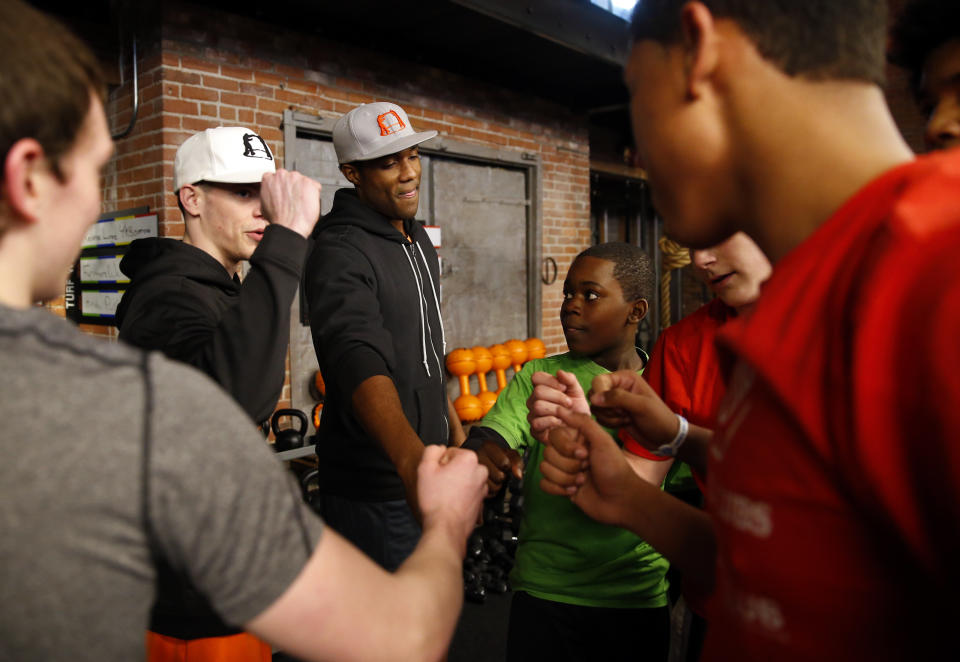George Foreman III: Coronavirus will change boxing business forever
George Foreman III opened his own boxing gym in Boston in 2014, and since then has gone national, opening up eight more Everybody Fights locations in New York, Philadelphia, Illinois, Georgia, and Kentucky. In 2020, 15 more locations were under construction or set to open.
Then coronavirus hit, physical gyms shut down, and fitness chains have been forced to bring their classes virtual. On March 25, Everybody Fights rolled out EBF Live, subscription classes taught by certified boxing instructors. The classes are marketed as “informed by Foreman’s experience training for his pro fights, adapted for people at all fitness levels and using minimal equipment (no bag necessary).” (Foreman, whose nickname in the ring was “Monk,” went 16-0 as a pro boxer before retiring; he was the only one of George Foreman’s five sons to follow his father into boxing.)
Now some states are slowly beginning to reopen, but Foreman thinks virtual classes will be the new normal for fitness chains, even after quarantine ends.
“Any business model that relies on cramming as many people as possible into a small space, sweat flying everywhere, people breathing like racehorses, that's over for the foreseeable future,” Foreman told Yahoo Finance Live. “The good news is, my father can train me virtually. He actually always trained me from his seat. You don’t need to be in person to train someone to box.”
Looking to the Peloton model
Taking the business model virtual “seemed like a little too much work” at first, Foreman says, but now 140 out of 800 Everybody Fights certified instructors are teaching virtual classes and the platform has racked up more than 250,000 streams.
Foreman lists Peloton bikes, Ergatta and Hydrow rowing machines, and the DailyBurn app as fitness brands that have “proven that we can move people digitally.” He aims for Everybody Fights to become the go-to virtual option for boxing workouts.
That’s not to say there will never be in-person training classes. But Foreman expects they’ll have to shrink—which will hurt boutique fitness chains, but could also mean lower overhead costs. “People are going to want to come blow off some steam and hit the bags, that’s always going to be there, but not 200 people per hour—maybe 50,” Foreman says. “So if you take a 50-person classroom and it’s now 15-20, the business model has to change, you have to be there for a different reason... A big part of being in the boutique fitness space was your personnel costs, your people. If you’re all digital, you use your stores for something different.”

Pro boxing may also stay virtual
It’s not just boxing fitness classes that will change. Amid widespread concerns that live sports ticket sales could take more than a year to come back, Foreman expects combat sports to adapt to the stay-at-home era. (The UFC returned on May 9 with no fans present.)
“The boxing industry did not survive on ticket sales, it always survived on Pay-Per-View,” Foreman says. “It’s been an at-home business in the first place, otherwise it would have been dead many years ago. If you play to a digital-only crowd, it’s a lot cheaper, and the fighters will make about the same thing. It’s not going anywhere, but now they have to say, ‘This is a studio, and we’re going to make this exciting without the crowd cheering.’ As long as there are good fights to be made, that business is not going anywhere, and in my opinion it’s going to be way more profitable.”
Boxing is far from the only sport that might be hosting crowd-less events: MLB, NBA, NFL, NHL, and MLS are all planning for the same likelihood, but some leagues are far better suited than others, because of their revenue sources, to pull that off.
—
Daniel Roberts is an editor-at-large at Yahoo Finance. Follow him on Twitter at @readDanwrite.
Read more on how coronavirus is hitting the sports world:
Coronavirus could have long-lasting impact on live sports ticket sales
MLS Commissioner: Playing in empty stadiums would be particularly bad for us
Korean baseball's return is a bitter pill for American sports, but a win for ESPN
Nike is poised to weather coronavirus far better than Adidas and Under Armour
Fanatics sees core parts of its business fall 100% with sports on hold due to coronavirus
Coronavirus hits sports leagues: March Madness canceled; NBA, NHL, MLS seasons on hold

 money
money 
